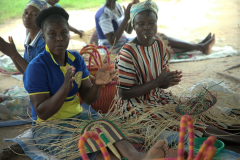
Agriculture stands as a cornerstone of Ghana’s economy, particularly in the Northern region, playing a pivotal role as a vital source of sustenance. According to a report by the Food and Agriculture Organisation of the United Nations, this sector contributes a significant 54% to the country’s Gross Domestic Product (GDP) and employs approximately 52% of the nation’s labour force, with women comprising around 39%. In Ghana, women predominantly engage in farming, producing not only for their families but also for income, supporting themselves and their families by selling a portion of their farm produce.
In the village of Amanga, nestled in the nation’s Upper East region, the lives of over 800 residents revolve around small-scale farming. This community thrives during the rainy season, relying on their agricultural pursuits for livelihood. However, the idyllic scenes transform into a struggle as the rains cease, plunging the community into uncertainty during the dry season. While this challenge affects the entire community, its most severe impact is borne by women.
In such challenging circumstances, many of these women, especially the younger ones, opt to migrate to the nation’s capital city, Accra, and other urban areas to engage in various income-generating activities, such as head porting. Unfortunately, in these situations, these women abandon their families, including their children. Regrettably, most of them choose not to return to care for their children, leaving the youngsters to endure hunger, with many eventually dropping out of school. Local authorities and women’s groups in this community have diligently explored avenues to diversify sources of livelihood. Unfortunately, these efforts did not yield significant results.
In response to these challenges, GMI Global Vision Foundation, a small non-governmental organization (NGO) based in Bolgatanga, embarked on a mission to help the women and families of Amanga: the implementation of a Basket Weaving Project. Despite their noble intentions, the organization faced financial constraints. It seemed nearly impossible to secure the necessary start-up capital of sixty-seven thousand two hundred Ghanaian Cedis (GHS 67,200, approximately $4600 dolars). “We found ourselves in a very tough situation, wondering if this project could see the light of day. Mobilising funds to kick-start the project has not been easy,” remarked Samuel Azure, the Executive Director of the organization.
After a series of struggles to mobilise funds for the project, no results were achieved until 2022 when they participated in a local fundraising training under the Change the Game Academy initiative supported by Wilde Ganzen. The training facilitated by West Africa Civil Society Institute (WACSI) in Ghana, proved to be a major game-changer, catapulting the project to life. Armed with the skills from the training, the organisation leveraged local fundraising techniques to mobilise an amount of six thousand seven hundred Ghana Cedis (GHS 6,700, approximately $460 dolars). However, despite their efforts, this amount proved inadequate to cover even the expenses of mobilising resource personnel capable of training the women in the art of basket weaving.
Amidst these challenges, a glimmer of hope emerged. WACSI stepped in to provide match-funding support of fifteen thousand Ghana Cedis (GHS 15,000, approximately $1,025 dolars) to turn this noble dream into reality under the Change the Game Academy initiative. This financial support, combined with an additional amount of six thousand seven hundred Ghana Cedis (GHS 6,700, approximately $460 dolars) mobilised locally by the organisation, brought their efforts to fruition, marking the starting point of significant progress in the lives of these women.
With an amount of twenty-one thousand seven hundred Ghana Cedis (GHS 21,700 approximately $1460 dolars), GMI Global Vision Foundation commenced the basket weaving project in Amanga. The project offers craftsmanship in basket weaving.
Upon successful completion of the training, participants are equipped with skills that they apply to weave baskets, which are then sent to market centres in nearby towns for sale. “It began with 25 women as first apprentices. A few months later, over 100 women had completed training and were already weaving for sale,” Azure said. “Through the support of WACSI and its partners, the positive outcome of the funding we received is evident. These women, who might have otherwise become head porters, have been empowered to be economically independent,” he noted.
Presently, GMI Global Vision Foundation is transforming the lives of over 100 women in Amanga through the Basket Weaving Project. This innovative initiative has provided these women with a chance to not only generate income from farming but also through the sale of handwoven baskets. Serving as an alternative source of income for the residents of Amanga, this project has made a substantial impact on enhancing the quality of life for families in this community.“At the onset of our training, I struggled with the techniques. However, through dedication and practice, I can now weave independently,” one of the beneficiaries, Awula Frasimi, said, beaming with smiles.
In her newfound job, Frasimi, a young mother in her late 20s, sells her crafts for twelve Ghana cedis (GHS 12.00) per basket. On her lucky market days, she could make a sale of over two hundred Ghana cedis (GHS 200). She uses this money to take care of her child and the family. “I take pride in weaving and sending my products to market centres for sale. This brings me great joy as I no longer depend solely on farming to support my family,” she added.